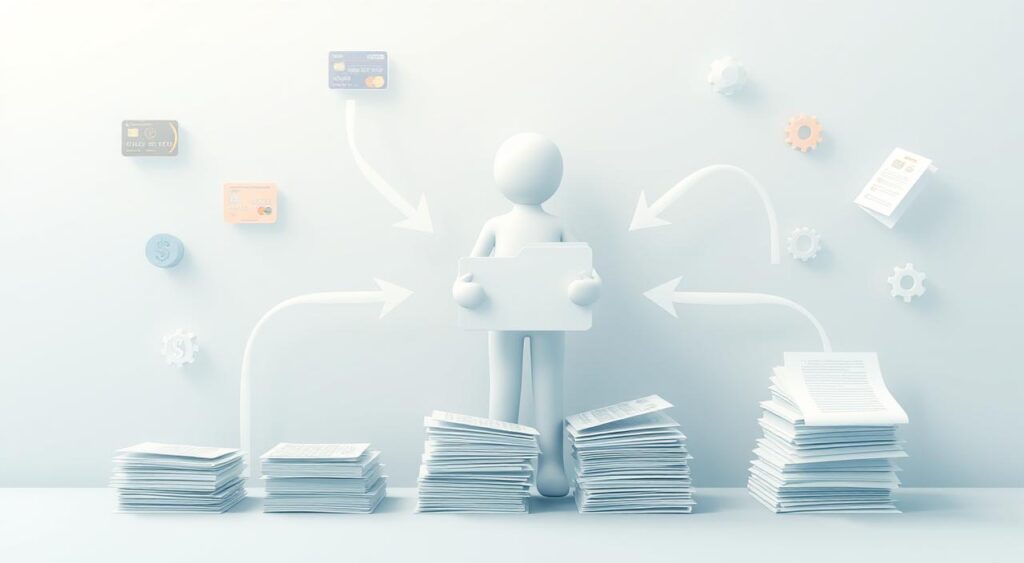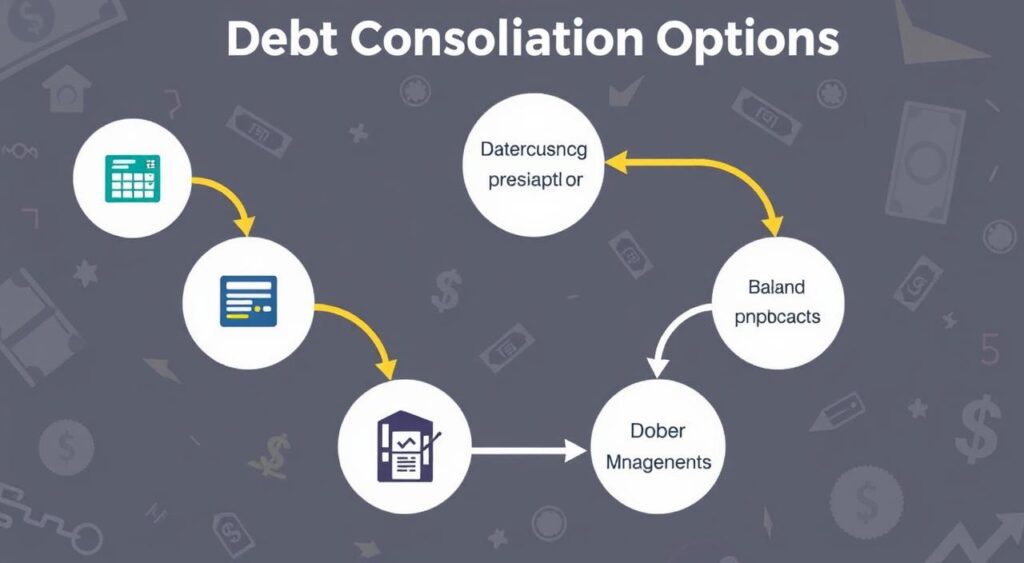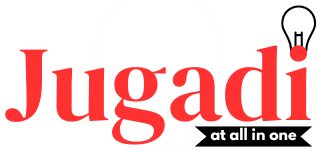Managing personal finance can be tough, especially with many debts. If you’re struggling with different credit card bills and loans, a debt consolidation loan might help. This guide will explain how debt consolidation loans work, their benefits, and how to combine your debts into one manageable payment.
Key Takeaways :
- Debt consolidation loans combine multiple debts into one, fixed-rate loan with a lower interest rate.
- This can make your monthly payments simpler and save you money on interest over time.
- To qualify for a debt consolidation loan, you need a good credit score, stable income, and a manageable debt-to-income ratio.
- Debt consolidation can help manage your finances, but it’s crucial to understand the risks and consider all options before deciding.
- By consolidating your debts, you can make your payments easier and work towards becoming debt-free more efficiently.
Understanding Debt Consolidation: Basic Principles and Benefits
Debt consolidation is a smart financial move. It can make paying back your debts easier and save you money. By combining different debts into one, you can manage your finances better and possibly get lower interest rates.
Key Advantages of Consolidating Your Debt
One big plus of debt consolidation is lower monthly payments. Getting a better interest rate can cut down what you owe each month. This frees up money for other important financial goals. It also makes tracking your payments simpler, reducing the chance of missing or late payments.
Types of Debt You Can Consolidate
- Credit card balances
- Personal loans
- Student loans
- Medical bills
- Payday loans
How Much Money You Can Save
Debt consolidation can save you a lot of money. For instance, if you owe $20,000 on credit cards at 18% interest, consolidating to a 10% loan can save over $3,000 in interest. Plus, paying off your debt faster means you’ll save even more.
“Debt consolidation can be a powerful tool to take control of your finances and achieve your financial goals.” – Financial Expert, Jane Doe
How Debt Consolidation Loans Function in Today’s Market
Debt consolidation loans can seem overwhelming, but knowing how they work can help. Today, lenders look closely at your credit and finances when you apply. This helps them decide if they can lend to you.
The debt consolidation process has a few main steps:
- Credit Assessment: Lenders check your credit history, score, and payment habits. This tells them how likely you are to pay back the loan.
- Loan Terms Evaluation: They look at your income, debt, and how well you can pay back the loan. This helps them set the loan’s interest rate, amount, and how long you’ll pay it back.
- Lender Evaluation: Looking at offers from different lenders can help you find the best deal. This ensures you get the best terms and conditions.
After picking a lender and applying, you can start consolidating your debt. The lender will pay off your old debts. This lets you make just one monthly payment, which can save you money and help you pay off your debt faster.
Read also:- Personal Loan Approval with a Credit Score Under 650: Steps You Can Take
“Consolidating my debt was a game-changer for me. It simplified my finances and saved me a significant amount of money in the long run.”
Understanding debt consolidation can help you take charge of your finances. It’s important to do your research, compare options, and work with your lender. This way, you can find the best solution for your financial situation.

Qualifying Requirements for Debt Consolidation Loans
To get a debt consolidation loan, you need to meet certain criteria. Knowing these requirements helps you get approved and get good loan terms.
Credit Score Requirements
Lenders want a credit score of 660 or more for a debt consolidation loan. This shows you’ve borrowed responsibly and paid on time. If your score is lower, you might pay more interest or need more to qualify.
Income and Employment Verification
Lenders check your income and employment status to see if you can pay back the loan. They might ask for pay stubs, W-2s, or other proof of income. If you’re self-employed, you might need to show tax returns to prove your income.
Read also:- Which Bank is Best for a Home Loan in 2024?
Debt-to-Income Ratio Explained
The debt-to-income ratio (DTI) is very important. Lenders like a DTI of 50% or less. This means your monthly debt payments shouldn’t be more than half your monthly income. A lower DTI shows you can handle more debt.
“Improving your credit score, boosting your income, and lowering your debt-to-income ratio can help you qualify for a better debt consolidation loan.”
By knowing these loan eligibility rules, you can improve your financial situation. This increases your chances of getting a debt consolidation loan that fits your financial goals.

Different Types of Debt Consolidation Options
There are many ways to consolidate your debts. You can look into secured loans, unsecured loans, balance transfer cards, and home equity loans. Each has its own benefits and downsides. Let’s dive into each option.
Secured Loans for Debt Consolidation
Secured loans, like those backed by your home or car, often have lower interest rates. But, there’s a risk of losing your collateral if you can’t pay back the loan. This might be right for those with good credit and stable finances.
Read also:- How Can I Save Money on Cheap Car Insurance?
Unsecured Loans for Debt Consolidation
Unsecured loans don’t need collateral. They might have higher interest rates, but they’re more flexible. They’re a good choice for those with fair to good credit.
Balance Transfer Credit Cards
Balance transfer cards let you combine debts into one card. They often have a 0% APR for a short time. This can save you on interest. But, make sure to understand the fees and terms to avoid surprises.
Home Equity Loans
Home equity loans or lines of credit use your home’s equity. They often have lower interest rates. But, there’s a risk of losing your home if you can’t make payments.
When choosing a debt consolidation option, consider the pros and cons. Your credit score, income, debt, and goals are important. They help decide the best option for you.
| Debt Consolidation Option | Pros | Cons |
|---|---|---|
| Secured Loans | Lower interest rates Potential for longer repayment periods | Risk of losing collateral if you default Requires good credit and stable finances |
| Unsecured Loans | No collateral required More flexible and convenient | Higher interest rates than secured loans May have shorter repayment periods |
| Balance Transfer Cards | 0% introductory APR Consolidate multiple debts onto a single card | Limited 0% APR period Potential for high fees and penalties |
| Home Equity Loans | Lower interest rates Longer repayment periods | Risk of losing your home if you default Requires equity in your property |
The right debt consolidation option depends on your financial situation and goals. It’s key to weigh the pros and cons of each. Choose the one that fits your long-term financial health.

Interest Rates and Terms: What to Expect
When looking at debt consolidation loans, it’s key to know about interest rates and terms. We’ll explore fixed vs. variable rates, typical repayment periods, and fees. This will help you make a smart choice.
Fixed vs. Variable Interest Rates
First, think about whether your loan’s interest rate will be fixed or variable. A fixed rate stays the same, making your payments predictable. On the other hand, a variable rate can change, affecting your payments.
Typical Loan Terms and Repayment Periods
Debt consolidation loans usually have terms from 3 to 7 years. Longer terms mean smaller monthly payments but more interest paid over time. Think about your finances and what you can handle.
Understanding APR and Additional Fees
When comparing loans, watch the Annual Percentage Rate (APR) and extra fees. The APR shows the loan’s total cost, including interest and fees. Also, look out for origination fees or prepayment penalties that can add up.
Knowing about interest rates, terms, and fees helps you choose the right debt consolidation loan. The right one can simplify your payments and save you money in the long run.
Steps to Apply for a Debt Consolidation Loan
Getting a debt consolidation loan might seem hard, but it’s easier than you think. First, collect all needed documents. This includes your latest pay stubs, tax returns, and a list of your debts. This helps lenders understand your financial situation and choose the best loan for you.
Then, look for different lenders to find the best rates and terms. Online tools can help you compare offers easily. Once you find the right lender, you can apply online or through their preferred method.
The approval process involves a credit check and verifying your income and job. If you’re approved, the lender will finalize the loan details. They’ll then send the money to your creditors. This simplifies your payments into one easy monthly payment, helping you manage your finances better.
FAQ
What is a debt consolidation loan?
A debt consolidation loan lets you merge several debts into one. This includes credit card balances, personal loans, and medical bills. It simplifies your monthly payments into one.
How can a debt consolidation loan help me?
Debt consolidation loans offer many benefits. They make payments easier, may lower interest rates, and help you pay off debts faster.
What types of debt can I consolidate?
You can consolidate many debts. This includes credit card balances, personal loans, student loans, and medical bills.
How much money can I save with a debt consolidation loan?
The savings from a debt consolidation loan vary. It depends on your current rates, loan terms, and total debt. Many save hundreds or thousands of dollars in interest.
What are the qualification requirements for a debt consolidation loan?
Lenders look at your credit score, income, job, and debt-to-income ratio. They check if you can afford the new monthly payments.
What are the different types of debt consolidation options?
There are many debt consolidation options. These include secured loans, unsecured personal loans, balance transfer credit cards, and debt management plans.
How do I know what interest rate and loan terms to expect?
The interest rate and terms depend on your credit score, loan type, and market conditions. Rates can be fixed or variable. Loan terms range from 2 to 7 years or more.
What is the process for applying for a debt consolidation loan?
To apply, gather documents like pay stubs, tax returns, and debt statements. Compare offers, submit an application, and manage the approval and disbursement process.

